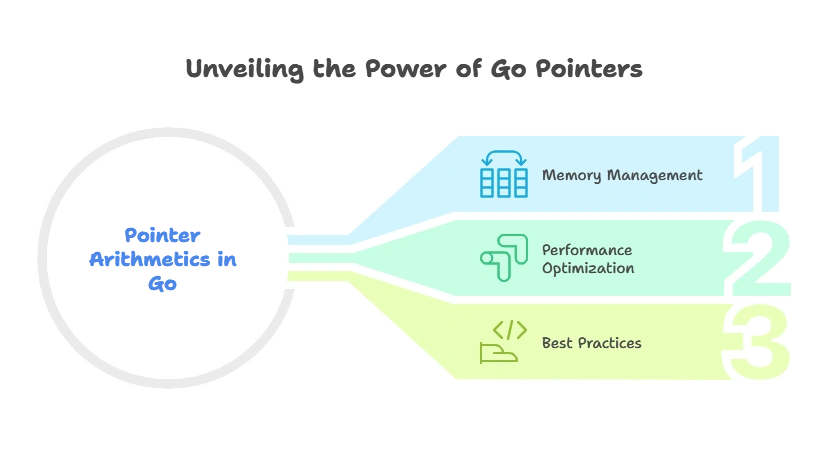Pointer Arithmetics
Understanding pointers and their arithmetic is crucial for writing efficient and performant code in Go language. Pointers allow direct memory manipulation, enabling developers to optimize memory usage and achieve better performance. In this comprehensive guide, we will delve into pointers arithmetic in Go, starting from the basics and gradually progressing to more advanced topics.
Pointer Arithmetic Basics
Incrementing and Decrementing Pointers
Pointer arithmetic allows you to increment or decrement the memory address stored in a pointer variable.
var arr [3]int = [3]int{1, 2, 3}
var ptr *int = &arr[0]
ptr++
fmt.Println(*ptr) // Output: 2
ptr++: Increments the memory address stored inptrby the size ofint.
Pointer Arithmetic with Arrays
When performing pointer arithmetic on arrays, the pointer moves to the next element in the array.
var arr [3]int = [3]int{1, 2, 3}
var ptr *int = &arr[0]
ptr++
fmt.Println(*ptr) // Output: 2
ptr++: Moves the pointer to the next element in the array.
Advanced Pointer Arithmetic
Pointer Arithmetic with Slices
Slices are more flexible than arrays and allow dynamic resizing. Pointer arithmetic with slices behaves similarly to arrays.
slice := []int{1, 2, 3}
ptr := &slice[0]
ptr++
fmt.Println(*ptr) // Output: 2
ptr++: Moves the pointer to the next element in the slice.
Pointer Arithmetic with Structs
Pointer arithmetic can also be applied to structs, allowing efficient manipulation of complex data structures.
type Point struct {
x, y int
}
func main() {
p := Point{10, 20}
ptr := &p
ptr.x++
fmt.Println(ptr.x) // Output: 11
}
ptr.x++: Increments the value ofxfield in thePointstruct through pointer arithmetic.
Pointer Arithmetic and Memory Management
Memory Allocation with Pointers
In Go, pointers play a crucial role in memory management. Understanding how memory allocation works with pointers is essential for writing efficient and memory-safe code.
var ptr *int = new(int)
*ptr = 10
fmt.Println(*ptr) // Output: 10
new(int)allocates memory for an integer on the heap and returns a pointer to it.*ptr = 10assigns the value 10 to the memory location pointed to byptr.
Dynamic memory allocation with pointers is useful when you need to allocate memory dynamically based on runtime requirements
Memory Deallocation with Pointers
While Go automatically handles memory deallocation through garbage collection, understanding how to manually deallocate memory with pointers is important for scenarios where immediate memory release is necessary.
var ptr *int = new(int)
*ptr = 10
fmt.Println(*ptr) // Output: 10
ptr = nil
ptr = nildeallocates the memory previously allocated for the integer variable pointed to byptr.
Explicitly setting a pointer to nil indicates that it no longer points to valid memory, allowing the garbage collector to reclaim the memory.
Pointer Arithmetic and Performance Optimization
Pointer Arithmetic in Performance Critical Code
In performance-critical scenarios, utilizing pointer arithmetic can lead to significant performance gains by reducing memory overhead and improving cache locality.
func sumSlice(ptr *int, size int) int {
sum := 0
for i := 0; i < size; i++ {
sum += *(ptr + i)
}
return sum
}
*(ptr + i)accesses the value at the memory location pointed to byptrplus the offseti.
Pointer arithmetic can be particularly beneficial when dealing with large data structures or implementing low-level algorithms.
Pointer Arithmetic and Data Structures
Understanding pointer arithmetic is crucial when working with complex data structures like linked lists, trees, and graphs. Pointers allow efficient traversal and manipulation of these structures, leading to optimized algorithms and reduced memory consumption.
type Node struct {
value int
next *Node
}
func traverseList(head *Node) {
current := head
for current != nil {
fmt.Println(current.value)
current = current.next
}
}
current = current.nextmoves the pointer to the next node in the linked list.
Pointer arithmetic enables efficient traversal of linked data structures, making it easier to implement algorithms like insertion, deletion, and searching.

Mastering pointers arithmetic in Go language is essential for writing efficient, performant, and memory-safe code. By understanding the various aspects of pointers arithmetic, including memory management, performance optimization, and best practices, you can leverage the full power of pointers to build robust and scalable applications.Keep experimenting, learning, and applying pointers arithmetic in your Go projects to unlock new possibilities and enhance your programming skills. Happy coding !❤️
